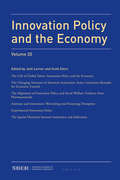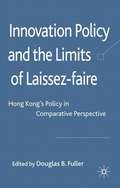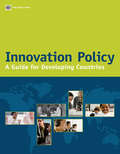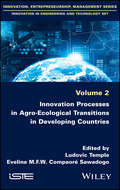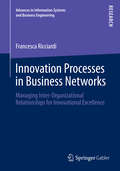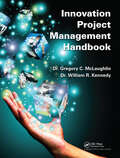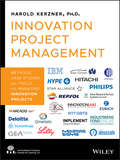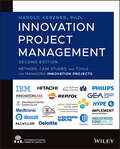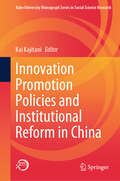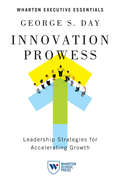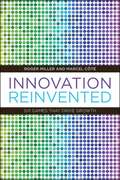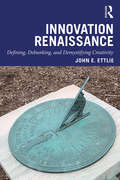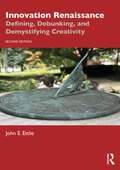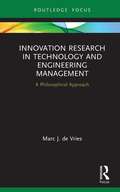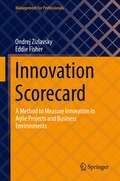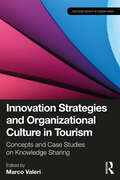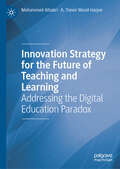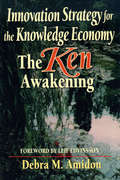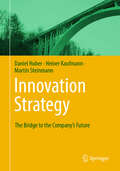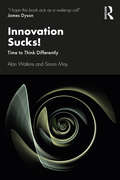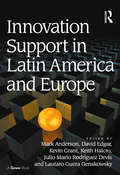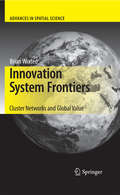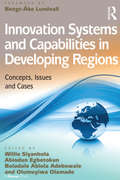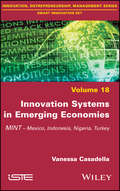- Table View
- List View
Innovation Policy and the Economy, 2019: Volume 20 (National Bureau of Economic Research Innovation Policy and the Economy)
by The University of Chicago PressThe chapters in this twentieth volume of Innovation Policy and the Economy present research on the interactions among public policy, the innovation process, and the economy. One explores changes in the ability of the U.S. to attract talented foreign workers and the role of sponsoring institutions in shaping immigration policy. Another explains how the division of innovative labor between research universities and corporate labs affected productivity growth and the transformation of knowledge into new products and processes. A third reviews different innovation policies and their performance in the pharmaceutical sector. Next is a chapter on the effects of competition policy on innovation, “creative destruction,” and economic growth. A fifth chapter studies how experimental policy design can be a cost-effective way to attain program goals. The last chapter examines geographic disparities in innovation, joblessness, and technological dynamism and studies how reallocation of grants and geographically targeted entrepreneurship policy could affect labor supply and welfare.
Innovation Policy and the Limits of Laissez-faire
by Douglas B. FullerHong Kong's laissez-faire tradition has crippled attempts to transform it into a more knowledge-intensive economy and this is a lesson with wide applicability. Many emerging economies face innovation bottlenecks, but even some more advanced economies face similar constraints and may benefit from the lessons of its negative example.
Innovation Policy: A Guide for Developing Countries
by World BankInnovation in all its forms, particularly technological innovation, has become a crucial driver of growth, enhancing competitiveness and increasing social well-being in all economies of the world. In a broad and diversified sense, innovation comprises not only the creation of new technology, but even more important, it includes the diffusion and use of products, processes, and practices that are new in a given country context. Inspired by the experiences of both industrial and developing countries, this book focuses on the needs and issues of the latter. Aiming at creating a climate in which innovative initiatives can multiply and flourish, innovation policy, by its very nature, touches such diverse policy areas as education and training, skills development, science and research, the business environment, information and communication technology, and other infrastructure. Adopting this interdepartmental perspective, this guidebook presents, in detail, the actions required in such a varied set of policy areas that typically work in silos. It offers also insights on the implementation of innovation policies in the difficult contexts of low and medium income countries characterized by the resistance of innovation systems to significant improvements. 'Innovation Policy: A Guide for Developing Countries' is geared toward the policy-making community. This large group includes not only those who deal directly with technology, industry, science, and education but also those in charge of finance and economics. Indeed, it includes the top government leadership, which plays a crucial role in successful innovation policies.
Innovation Processes
by Robert S. Kaplan David P. NortonSustaining competitive advantage requires that organizations continually innovate to create new products, services, and processes. Exceptional innovation capabilities determine industry leaders. This chapter identifies high-level objectives and associated measures for four innovation processes, including identifying opportunities for new products and services, and bringing new products and services to market. A case study follows the chapter.
Innovation Processes in Agro-Ecological Transitions in Developing Countries
by Ludovic Temple Eveline M. Compaore SawadogoThis book investigates the interactions between different shifts in innovation models. It underlines ecological conditions and production intensification in the agriculture sector. In total six innovation processes were analyzed in different countries such as Burkina Faso, Cameroon, Haiti, Madagascar and Senegal. The similarities between these case studies are that they all demonstrate that sustainable and sufficient network between actors of the innovation are particularly useful for the development of agricultural innovation systems. The different papers demonstrate that there is a need for more commitment of public policy in innovation processes.
Innovation Processes in Business Networks
by Francesca RicciardiIn today's networked economy, each organization is more and more shaped by the system of its long-term business interactions. Innovation processes cannot be successfully designed and managed unless the complex influences of business networking on innovation processes and innovation-related performances are clearly understood. But extant theories on business networks are fragmented, and each of them, taken singularly, provides only partial or poor understanding of the impacts of business networking on innovation performances. Based on qualitative research on three exemplary worst practices and on expert panel discussion and validation, Francesca Ricciardi develops novel quantitative models in this theory-building work to explain innovation performances in different interorganizational networks.
Innovation Project Management Handbook
by Dr.Gregory C. McLaughlin Dr. William KennedyInnovation Project Management Handbook provides organizational leaders and decision-makers with a cadre of agile, disciplined, and transformational tools and processes for improving innovation opportunity outcomes and achieving sustained innovation project success. The authors introduce new tools and processes developed over their decades of work i
Innovation Project Management: Methods, Case Studies, and Tools for Managing Innovation Projects
by Harold KerznerActionable tools, processes and metrics for successfully managing innovation projects Conventional project management methods are oftentimes insufficient for managing innovation projects. Innovation is lost under the pre-determined scope and forecasted environments of traditional project management. There is tremendous pressure on organizations to innovate, and the project managers responsible for managing these innovation projects do not have the training or tools to do their jobs effectively. Innovation Project Management provides the tools, insights, and metrics needed to successfully manage innovation projects—helping readers identify problems in their organization, conceive elegant solutions, and, when necessary, promote changes to their organizational culture. There are several kinds of innovation—ranging from incremental changes to existing products to wholly original processes that emerge from market-disrupting new technology—that possess different characteristics and often require different tools. Best-selling author and project management expert Harold Kerzner integrates innovation, project management, and strategic planning to offer students and practicing professionals the essential tools and processes to analyze innovation from all sides. Innovation Project Management deconstructs traditional project management methods and explains why and how innovation projects should be managed differently. This invaluable resource: Provides practical advice and actionable tools for effectively managing innovation projects Offers value-based project management metrics and guidance on how to establish a metrics management program Shares exclusive insights from project managers at world-class organizations such as Airbus, Boeing, Hitachi, IBM, and Siemens on how they manage innovation projects Explores a variety of types of innovation including co-creation, value-driven, agile, open versus closed, and more Instructors have access to PowerPoint lecture slides by chapter through the book’s companion website Innovation Project Management: Methods, Case Studies, and Tools for Managing Innovation Projects is an essential text for professional project managers, corporate managers, innovation team members, as well as students in project management, innovation and entrepreneurship programs.
Innovation Project Management: Methods, Case Studies, and Tools for Managing Innovation Projects
by Harold KerznerINNOVATION PROJECT MANAGEMENT ACTIONABLE TOOLS, PROCESSES, AND METRICS FOR SUCCESSFULLY MANAGING INNOVATION PROJECTS, WITH EXCLUSIVE INSIGHTS FROM WORLD-CLASS ORGANIZATIONS AROUND THE WORLD The newly revised Second Edition of Innovation Project Management offers students and practicing professionals the tools, processes, and metrics needed to successfully manage innovation projects, providing value-based innovation project management metrics as well as guidance for how to establish a metrics management program. The highly qualified author analyzes innovation from all sides; through this approach, Innovation Project Management breaks down traditional project management methods and explains why and how innovation projects should be managed differently. The Second Edition includes exclusive insights from world-class organizations such as IBM, Hitachi, Repsol, Philips, Deloitte, IdeaScale, KAUST, and more. It includes six all new case studies, featuring a dive into brand management innovation from Lego. Each case study contains questions for discussion, and instructors have access to an Instructor’s Manual via the book’s companion website. Specific ideas discussed in Innovation Project Management include: Continuous versus discontinuous innovation, incremental versus radical innovation, understanding innovation differences, and incremental innovation versus new product development Identifying core competencies using SWOT analysis and nondisclosure agreements, secrecy agreements, and confidentiality agreements Implications and issues for project managers and innovation personnel, active listening, pitching the innovation, and cognitive biases Measuring intangible assets, customer/stakeholder impact on value metrics, customer value management programs, and the relationship between project management and value With its highly detailed and comprehensive coverage of the field, and with case studies from leading companies to show how concepts are applied in real-world situations, Innovation Project Management is a must-have title for practicing project managers, as well as students in project management, innovation, and entrepreneurship programs.
Innovation Promotion Policies and Institutional Reform in China (Kobe University Monograph Series in Social Science Research)
by Kai KajitaniThis book focuses on the political economy behind innovation in China's new industrial sectors, particularly the effects of policies and government regulation in the absence of the rule of law. In its analysis, the book aims to elucidate the mechanisms that generate innovation from multiple perspectives while utilizing insights from political science and law. The analysis in this book focuses on the following three points. First, by examining Guizhou Province's Big-data industry promotion policy, "import substitution digitization" policy, and government intellectual property strategy, we seek to empirically clarify the extent to which Chinese government industrial policy has stimulated innovation. Next, we examine in detail the issues surrounding the "rule of law" in China regarding introducing anti-monopoly laws for digital platform companies and developing the intellectual property court system. Third, it focuses on the role played by local governments in industrial policy, including the impact of industrial guidance funds on the efficiency of the regional financial sector and the impact of local bond issuance on the effectiveness of resource allocation among regions.
Innovation Prowess: Leadership Strategies for Accelerating Growth (Wharton Executive Essentials)
by George S. DayA framework for achieving superior rates of organic growthAchieving superior growth through innovation is a top strategic priority for all companies. Yet most management teams struggle to reach their firm's ambitious growth targets and suffer slow growth. What distinguishes these growth laggards from growth leaders like IBM, Nike, LEGO, American Express, Amazon, and Samsung that realize their full potential for growth?Wharton professor George S. Day shows that growth leaders use their innovation prowess to accelerate their growth at a faster rate. In this essential guide, Day reveals how to build this prowess by combining discipline in growth-seeking activities with an organizational ability to innovate. Day shows managers how to set a growth strategy that is realistic while still stretching the organization; search for the best growth opportunities along the full spectrum of 14 growth pathways; aim their growth-seeking activities toward the creation of new customer value; learn to profit from the uncertainty of innovation by successfully assessing and containing risk; build the organizational muscle to implement an ambitious growth strategy; and move faster from ideas to impact.With the strategies, processes, and methods discussed in Innovation Prowess, leaders can build a tested and comprehensive strategy for driving organic growth year after year.The Wharton Executive Essentials SeriesThe Wharton Executive Essentials series from Wharton Digital Press brings the ideas of the Wharton School's thought leaders to you wherever you are. Inspired by Wharton's Executive Education program, each book is authored by globally renowned faculty and offers a quick-reading, penetrating, and comprehensive summary of the knowledge leaders need to excel in today's competitive business environment and capture tomorrow's opportunities.
Innovation Reinvented
by Roger Miller Marcel CôteInnovation is essential for businesses to survive in the long run, but there are no one-size-fits-all strategies for innovating successfully. A firm's specific business environment will determine what works and what does not work.Based on a global survey of innovative firms and on 50 in-depth case studies, Innovation Reinvented identifies six patterns or 'games' of innovation, each commanding best-of-class strategies and best practices. Examining recognized innovative companies - from Apple and Intel in the technology area to Proctor & Gamble and Clorox in mature markets - this book dispels the notion of innovation as a 'one-size fits all' or necessarily radical process. As Roger Miller and Marcel Côté demonstrate, the vast majority of innovations result from improvements in product features or business processes.Innovation Reinvented provides a unique framework for entrepreneurs and senior executives to identify the game(s) in which a business is involved, and which approaches are best-suited to win by competing on innovation.
Innovation Renaissance: Defining, Debunking, and Demystifying Creativity
by John E. EttlieInnovation is not easy. Understanding the liability of newness but the potential for greatness is the central theme of this work. Innovation Renaissance explores and debunks the myths that have arisen from the proliferation of misleading and often confusing popular press treatments of creativity and innovation. Examples include the notion that successful entrepreneurs are winners because they are innovative—whereas creativity and business start-up acumen are not the same, and are rarely paired—or the idea of disruptive technology, which has now become the buzzword equivalent to radical new technology products or services, despite the fact that new technologies tend to offer simple, limited-capability products or services to satisfy overlooked customer demand. The popularity of open innovation has spawned assumptions, like the idea that crowdsourcing will increase the number of truly new ideas—but in fact the more novel these ideas, the less likely they are to be adopted by incumbent firms because they are less familiar. Starting by defining innovation and the theories that have arisen surrounding it, Ettlie considers individual creativity and innovativeness, radical innovation, new products, new services, process innovation, and information technology. There is special emphasis on neglected topics such as the dark side of the innovation process—the unintended consequences of new ventures. Finally, the last chapter of the book summarizes a prescriptive model of the innovation process and attempts to answer the question: what causes innovation? Three major constructs are explored: leadership, enhancing capabilities and integration. This informative and unique text is designed as a resource for postgraduate students, academics, and professionals deeply committed to understanding and working through the innovation process. The book includes an introduction to the subject before moving on to an in-depth study of emerging evidence and topics in the field.
Innovation Renaissance: Defining, Debunking, and Demystifying Creativity
by John E. EttlieThe first edition of Innovation Renaissance was published just before the onset of Covid-19, begging the question: can innovation stand the test of a truly global crisis, such as the pandemic? The answer, as author John E. Ettlie finds in this revised and updated second edition, is a resounding "YES"! Built around the central narrative of the development of the vaccines to combat hospitalization for Covid-19 and its mutations, this second edition of Innovation Renaissance acquires new focus and relevance to the post-pandemic world in which we live.Starting by defining innovation and the theories that have arisen surrounding it, Ettlie considers individual creativity and innovativeness, radical innovation, new products, new services, process innovation, information technology, and artificial intelligence (AI). There is special emphasis on neglected topics such as the dark side of the innovation process—the unintended consequences of new ventures. Finally, the last chapter of this book summarizes a prescriptive model of the innovation process and attempts to answer the question: what causes innovation? Through the prism of the pandemic and the imperative quest to find a vaccine, this new edition examines and answers this question. Now fully revised and updated, this informative and unique book is designed as a resource for postgraduate students, academics, and professionals deeply committed to understanding and working through the innovation process. With a focus not just on where innovation has led us to date, but also on where it may take us in the future, the second edition of Innovation Renaissance will find an audience wherever innovation is taught or practiced.
Innovation Research in Technology and Engineering Management: A Philosophical Approach (Routledge Focus on Business and Management)
by Marc J. de VriesPhilosophy may not seem to be an obvious source to discover methods for successful product innovation management. However, this book shows that systematic reflection on the nature of product innovation management, supported by insights from the philosophy of technology, can illuminate the innovation process in technology and engineering. Presenting methodological guidelines and philosophical reflections, this book guides readers through each phase of product innovation. At each step, ideas from the philosophy of technology are translated into practical guidelines for managing these processes. The book works through the philosophical perspectives on innovation, methods in innovation design and research, and the value and ethical implications of innovation. Bridging the gap between philosophical context and practical methodologies, this book will be highly valuable for postgraduate students and academics researching and teaching innovation and philosophy of technology.
Innovation Scorecard: A Method to Measure Innovation in Agile Projects and Business Environments (Management for Professionals)
by Eddie Fisher Ondrej ZizlavskyThe concept of innovation is not new. It relates closely to the concept of change. Both are inevitable in today’s and tomorrow’s business environments. Standing still and hoping for the best is no longer a viable option. Innovation, by itself, is not a panacea for positive accomplishments. Of paramount importance to any business is how successful any innovation has actually been. This book brings together the knowledge, learning and experience from the author's practical applications of a newly developed and implemented Innovation Scorecard methodology to close exactly this shortfall. Their ‘one stop shop’ methodology is a complete end to end approach on how to measure the success of any innovation, irrespective of whether this relates to projects or business as usual work environments. This landmark methodology will provide the reader with an applied proof of concept across a range of business applications and a complete end to end process how to measure success including templates and worked examples. The book offers a starter-pack with suggested performance metrics to get the reader on the road to measuring the success of innovation and to encourage readers to develop how they view and feel about measuring the success of innovation. Furthermore, the book provides the reader with everything they need to know, ranging from a simple to follow user-friendly process to the application of suggested performance metrics and how to apply these in any business work environment, which is a requisite for creating a working environment within the reader’s organisation where innovation and forward-thinking are both encouraged and supported.
Innovation Strategies and Organizational Culture in Tourism: Concepts and Case Studies on Knowledge Sharing (Routledge Insights in Tourism Series)
by Marco ValeriThis book analyzes the importance of innovation as the key driver of sustained success in the tourism industry and the knowledge sharing process. It explores its impact on innovation capability and innovation performance of organizations. With 12 chapters written by 22 contributors, the book offers international reflections. The first part of the book focuses on innovation management strategies and analyzes the importance of innovation as the key driver of sustained success in the tourism industry. Tourism and hospitality firms develop innovations with specific objectives and goals in mind and have several approaches to measure performance accordingly. The second part of the book focuses on knowledge sharing through case studies. Chapters analyze the knowledge sharing process and its impact on the innovation capability and innovation performance of the firms. The essence of knowledge sharing is to provide a framework for management in their attempt to develop and enhance their organizational capability to innovate in tourism. This invaluable book provides both theoretical and practical insights into innovation strategies and knowledge sharing in tourism. It will interest students, scholars and researchers, as well as executives and practitioners in the field of tourism and hospitality management.
Innovation Strategy for the Future of Teaching and Learning: Addressing the Digital Education Paradox
by A. Trevor Wood-Harper Mohammed AlbakriThis book delves into the contemporary education paradox between traditional and digital education, with particular emphasis on the contemporary digital education tools and technologies that can facilitate education practices beyond pedagogy. The central argument of this book is that traditional education methods are no longer sufficient to meet the needs of education institutions and stakeholders, which is why digital education is the future to satisfy these needs. It considers the holistic nature of education practice beyond pedagogy and digital education technology to include other practices such as knowledge management, policy, and ethics, among other practices led by contemporary ICTs. It will be a vitally important resource for scholars and students of education practice, emerging technologies and innovation management, as well as business and organisational ethics.
Innovation Strategy for the Knowledge Economy
by Debra M AmidonInnovation Strategy for the Knowledge Economy is intended for managers who have practiced the best of quality and re-engineering management techniques and are ready to transform their organizations with the systematic notions of knowledge creation and application. It is for organization leaders who prefer to be inspired with innovation strategy than hit over the head with change management techniques. It does not deal with barriers, hurdles, or conflicts to be resolved; rather, it paints a possible vision of how we can take advantage of our collective learning to move an enterprise forward. This book provides the reader with a sound, practical framework for instituting innovation strategy beyond the traditional definition of flow of parts or finances. At the core is an understanding of the dual value of knowledge (content) and innovation (process) using 'real-time' learning as the methodology.Innovation Strategy for the Knowledge Economy introduces new managerial concepts such as: Value-System versus Value-ChainStrategic Business Network (SBN) versus Strategic Business Unit (SBU)Customer Success versus Customer SatisfactionIt is an invaluable resource for both managers and organization leaders.Debra Mae Amidon is Founder and Chief Strategist of Entovation International, a global innovation research and consulting network with outposts throughout the world. Her specialties include: knowledge management, learning networks, customer innovation, and enterprise transformation. Ms. Amidon holds degrees from Boston University, Columbia and MIT, where she was an Alfred P. Sloan Fellow.
Innovation Strategy: The Bridge to the Company’s Future
by Daniel Huber Heiner Kaufmann Martin SteinmannThe book provides a theoretically sound and practical approach to systematically developing an innovation strategy using new strategic tools, thereby ensuring a company's long-term competitiveness. The strategic foundations for innovation are developed step by step and clearly explained using an innovation framework. In this new understanding of strategy, a company follows a Two-Stars-Strategy. It consists of a present-oriented part and a future-oriented part. This way, companies align themselves simultaneously with two future stars. Learn the path to becoming an innovative company and sustainably enhance your company's innovation performance and future viability. This book is a translation of the original German edition “Innovationsstrategie“ by Huber et al., published by Springer-Verlag Germany in 2023. The translation was done with the help of artificial intelligence. A subsequent human revision was done primarily in terms of content, so that the book will read stylistically different from a conventional translation.
Innovation Sucks!: Time to Think Differently
by Simon May Alan WatkinsBusinesses spend billions on innovation with very little to show for their investment or effort. This book challenges some of the ‘ingrained truths’ of innovation and suggests a different approach. Innovation is not the creation of a novel idea. It is the successful commercialisation of that novel idea. Rather than starting with a costly, time-consuming problem assessment that seeks to push potential solutions through an innovation funnel, an ‘impeller approach’ starts with possible solutions and gets the market to pull the best ones forward so they can fail fast or flourish fast. This approach is made possible by the addition of a ‘bee’ – a new type of integrative thinker who can harvest the existing knowledge from the ‘meadow of experts’. Completely reversing the innovation process means organisations are much better placed to win in the market rather than focusing on finding theoretical solutions or clearing innovation stage gates. In addition, this approach also recognises that the people who shepherd the solution through the ideation and testing stage are not the same people who must then take that solution to market for successful commercialisation. Given the current innovation failure rate, coupled with the fact that society is beset with multiple wicked problems, it’s time to think differently and innovate innovation itself. This book is essential reading for Heads of Innovation and Commercialisation, Directors of Marketing, Heads of New Product Development and New Service Development, Strategy Directors, Chief Technology Officers, Government advisers and policy makers.
Innovation Support in Latin America and Europe: Theory, Practice and Policy in Innovation and Innovation Systems
by Mark Anderson David Edgar Kevin Grant Keith Halcro Julio Mario Devis Lautaro Guera GenskowskyLatin America represents one of the most dynamic business regions in the world. Innovation Support in Latin America and Europe explores the need for training innovation professionals, identifies appropriate strategies and best practice for ensuring its delivery, and reflects the outcomes of a major innovation and knowledge transfer project. Academics, business professionals, policy makers, and trade representatives, all contribute to review the literature and existing practices of innovation, and explore the often misunderstood and contested terrain that surrounds innovation theory, policy and practice. In this book you will find a comparative insight into Latin American and European approaches to innovation management and innovation in practice, and an examination of how innovative ideas are exploited for a specifically Latin American context. With chapters which offer insights from both academics and practitioners, the text offers a refreshing, contemporary and trans-national perspective and a clear, concise and enriching discussion on the interplay between research, policy and practice. Innovation Support in Latin America and Europe will appeal to academics and researchers, higher level students, policy makers and business leaders, particularly those with any interest in Latin America.
Innovation System Frontiers
by Brian WixtedRecent economic transformations in the world economy are progressing in two divergent directions - international production fragmentation and industrial agglomeration. Based on extensive data analysis and using models of interdependencies between key economies, this book analyses innovation systems that cross national borders. It is shown that technological complexity is an important factor in the formation of highly specific production networks, and why, for a number of production systems, fragmentation and clustering are two sides of the same coin. By outlining the picture of a world economy structured around networks of clusters and joined together through systems of linkages of components, people and knowledge flows, the author helps to promote a better understanding of recent economic transformations.
Innovation Systems and Capabilities in Developing Regions: Concepts, Issues and Cases
by Willie Siyanbola Olumuyiwa OlamadeIn today's knowledge-driven world, innovation and innovation systems have become key policy issues. However, the extent of knowledge that is available on these concepts in less developed countries is still relatively low. Much of what we know about innovation theory and systems has come from the developed countries and reflects their world view. This apparent knowledge deficit has major implications for less developed countries. Innovation Systems and Capabilities in Developing Regions adds to the growing body of knowledge on developing countries. The theoretical and empirical case studies presented here advance the notion that, while developing countries may not engage in frontier research, a critical knowledge base upon which these countries compete for global markets is emerging. There is evidence that state and non-state actors are increasingly emphasising policies that sit within the framework of national innovation systems. This book illuminates this shift in policy competence at national levels. The contributions in this volume highlight the need for thorough understanding of the role of diffusion-based innovation linked to technology transfer and acquisition. They also provide empirical evidence on the drivers, dynamics and impact of such innovation in developing economies and the constraints that apply. Contributors also document the application of the innovation system approach in developing countries as well as the build-up and diffusion of technological capabilities within innovation systems. Academics, higher level students, policy makers and practitioners involved with innovation and the economics of technical change, particularly in developing countries, will find this a valuable book.
Innovation Systems in Emerging Economies: MINT (Mexico, Indonesia, Nigeria, Turkey)
by Vanessa CasadellaThe aim of this book is to review the innovation systems in their "classical" version before defining them in the light of emerging economies through the objectives of economic and sustainable development. If we return particularly to the innovation system and its importance, we will show through these new MINTs that their innovation systems are perpetuated, based on very localized experiments, despite the fragility of their links, the lack of national coherence of innovation and above all the weakness of their innovation policy.
